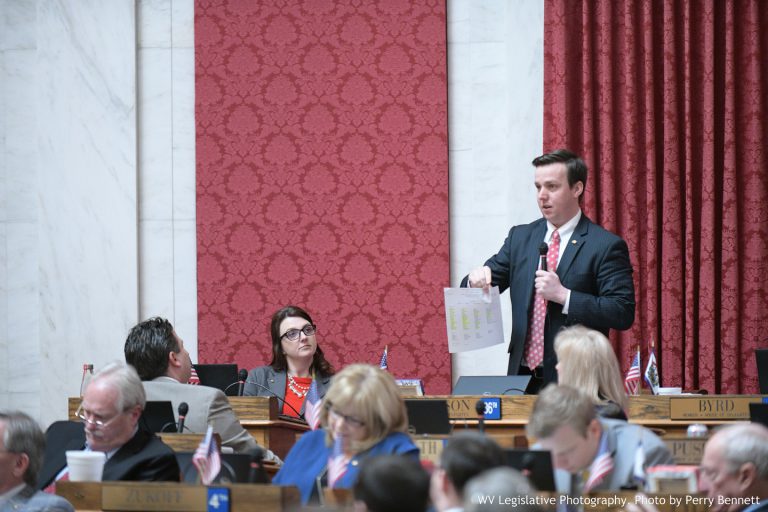The House of Delegates convened at 11 a.m. on Tuesday, March 5, for the 56th day of the legislative session. On this day, 20 Senate bills were up for passage on third reading, with a number of them regarding legislative rules for various state agencies.
Senate Bill 163, Senate Bill 175, Senate Bill 190, and Senate Bill 223 were all legislative rules bundles that were on third reading this day. All of these bundles were passed with little discussion, and made effective upon passage.
Noteworthy bills that were passed on third reading include Senate Bill 316, a bill to amend the provisions of the West Virginia Code relating to the correction of errors in payments to or from a municipal policeman’s or fireman’s pension and relief funds. The bill would authorize a municipality to approve continued overpayments of benefits from pension and relief funds for any retiree who retired prior to the enactment of the current provisions, instead of reducing the benefit payments to the correct amount as would be required under current law.
Senate Bill 491 passed after lengthy discussion that spanned over all three days of the bill being read. This bill would extend the statutory deadline for the implementation of automatic voter registration in conjunction with certain Division of Motor Vehicles (DMV) transactions from July 1, 2019 to July 1, 2021.
The bill spurred discussion regarding the department’s delay in getting automatic voter registration implemented after legislation mandating it was passed in 2016. Miscommunication between the DMV and the WV Secretary of State’s Office has led to automatic voter registration stalling after its passage. Several delegates believed that the passage of the bill would not hold the departments accountable.
“We as a legislative body have directed this agency to accomplish something,” Delegate Andrew Robinson, D-Kanawha said. “If we get more people involved, and we get more people voting, that’s an advantage for all of us. More good will be done, more community involvement will happen across the state, and this would be beneficial across the board.”
Other delegates said that the passage of the bill would help to ensure that the agencies involved will receive the help necessary to get the job done.
Delegate Moore Capito, R-Kanawha, spoke in defense of the bill’s passage, saying that it would provide a “statutory ultimatum” for the agencies, and was “necessary to getting all the moving parts to come together”.
After a lengthy debate, Senate Bill 316 passed in a vote of 61-38.
Senate Bill 624 also generated debate on the House floor, but was ultimately passed. This bill would require the State Board to allow county boards to use an alternative assessment, such as the ACT assessment, pursuant to the locally selected assessment option provided for in the federal Every Student Succeeds Act (ESSA).
All other bills on third reading were passed by the House of Delegates. All bills that were considered and passed can be accessed in the Calendar.
Senate Bill 1, a bill on second reading, was amended at length.
Senate Bill 1, a bill to increase access to the state’s community and technical schools, would create the Advanced Career Education (ACE) Program with the intention of fostering a connection between state high schools and community colleges, and it would also create the WV Invests Fund. The WV Invests Fund would fund the community college tuition of select WV students who qualify.
The House of Delegates unanimously adopted the primary amendment to Senate Bill 1, a strike-and-insert amendment from the House Education Committee. The amendment would make several changes. The strike and insert includes the requirement of the WV Chamber of Commerce to research and prepare a list of underserved industries in the state to ensure the proper programs are facilitated, and the addition of public baccalaureate institutions that offer associate programs.
Several secondary amendments to the primary amendment were also adopted on this day. A secondary technical amendment was made, and an amendment made by Delegate Phillip Diserio, D-Brooke, was also adopted.
Diserio’s amendment would encourage and foster cooperation between apprenticeship programs and community and technical schools.
The House is in Recess until 7 p.m. today, March 5.
They will reconvene to continue consideration of bills on second reading, consider bills on first reading, and to receive committee reports.
Committees Meeting After Floor Session Today:
-The House Pensions and Retirement Committee will meet directly following the 11 a.m. House floor session in 460-M.
-The House Committee on Energy will meet at 2:30 in 418-M.
– The House Committee on Finance will meet at 3 p.m. in 460-M for continued consideration of their agenda.
The House reconvened briefly at 7:00 p.m. to continue consideration of bills on second reading, consider bills on first reading, and to receive committee reports.
Bills that were advanced without amendment include Senate Bill 587, Senate Bill 675, and Senate Bill 187.
Senate Bill 285 was amended by the House Judiciary Committee. They offered a strike and insert to the bill which would allow for the local Health Department to order stoppage of sale if the homemade food is found to have caused a food-borne illness.
Senate Bill 537 was amended by the Health and Human Resource Committee to add in the WV Healthcare Authority as the reviewing entity.
Senate Bill 546, Senate Bill 617, and Senate Bill 653 all went under technical amendments on this day.
All bills on first reading were advanced.
The House of Delegates is adjourned untill 11 a.m. on Wednesday, March 6.
-The House Committee on Finance will meet directly after the House floor session.
Committees Meeting Tomorrow Morning:
– The House Rules Committee will meet at 10:45 a.m. behind the Chamber.





